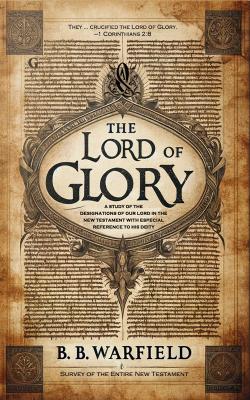A STUDY OF THE DESIGNATIONS OF OUR LORD IN THE NEW TESTAMENT WITH ESPECIAL REFERENCE TO HIS DEITY
"The Lord of Glory" by B. B. Warfield is a profound theological exploration of the designations of Jesus Christ in the New Testament. Warfield presents an in-depth analysis, demonstrating that every page, or perhaps every line, of the New Testament contributes to the portrait of Christ drawn by the whole. Warfield surveys the entire New Testament to teach how its' writers thought of Jesus, with a particular regard to His divinity. He also shows how Jesus refers to himself, the titles those around him used to address him, and how the disciples viewed him.
The central thesis of Warfield's work is the pervasive witness of the New Testament to the divinity of Christ. This is evident not only in direct assertions but also in the way Christ's divinity is taken for granted throughout the texts. The book explores the various designations of Christ found in the Synoptic Gospels and the Gospel of John, illustrating how these titles and the contexts in which they are used contribute to our understanding of Christ's divine nature.
Key theological points drawn from the book include:
The Divinity of Christ: Warfield argues that the New Testament, through its various designations and narratives, presents Christ not merely as a human figure but as a divine person. This is apparent in the way titles like "Lord" and "Messiah" expand in richness when applied to Christ, ultimately assimilating Him to the Divine Being itself.
Christ's Relationship with God: The book highlights the unique and close relationship between Christ and God, as indicated by the title "Son of God." This relationship is contrasted with that of servants, with Christ being presented as God's "heir" and acknowledged by evil spirits as the 'Son of God,' implying a sonship that transcends earthly office and function.
Christ's Messianic Mission: Warfield emphasizes that Christ's earthly life was marked by lowliness, yet it was part of a divine mission. Christ's life, death, and resurrection were for the redemption of humanity, fulfilling a divine purpose. This mission is intricately linked with His divine nature and authority, as He is portrayed as having authority over religious observances, the forgiveness of sins, and ultimately, the judgment and destiny of mankind.
The Synoptic Gospels' Perspective: The book explores the Synoptic Gospels' portrayal of Jesus, emphasizing His life as a divine intervention and the supernatural aspects of His ministry. From His authoritative teaching and control over demonic forces to His dominion over death and nature, Jesus's life is presented as thoroughly supernatural, challenging the notion of a purely human life.
In summary, "The Lord of Glory" offers a rich and detailed examination of the New Testament's portrayal of Jesus Christ, affirming His divinity, His unique relationship with God, and His central role in the salvation narrative. Warfield's work is a significant contribution to Christological studies, providing deep insights into the complex and profound nature of Jesus as presented in the New Testament.
TABLE OF CONTENTS
INTRODUCTORY
THE DESIGNATIONS OF OUR LORD IN MARK
MARK'S CONCEPTION OF OUR LORD
THE DESIGNATIONS OF OUR LORD IN MATTHEW
MATTHEW'S CONCEPTION OF OUR LORD
THE DESIGNATIONS OF OUR LORD IN LUKE AND THEIR IMPLICATIONS
THE JESUS OF THE SYNOPTISTS
THE JESUS OF THE SYNOPTISTS THE PRIMITIVE JESUS
THE DESIGNATIONS OF OUR LORD IN JOHN AND THEIR SIGNIFICANCE
THE DESIGNATIONS OF OUR LORD IN ACTS AND THEIR SIGNIFICANCE
THE CORROBORATION OF THE EPISTLES OF PAUL
THE WITNESS OF THE CATHOLIC EPISTLES
THE WITNESS OF THE EPISTLE TO THE HEBREWS
THE WITNESS OF THE APOCALYPSE
THE ISSUE OF THE INVESTIGATION
